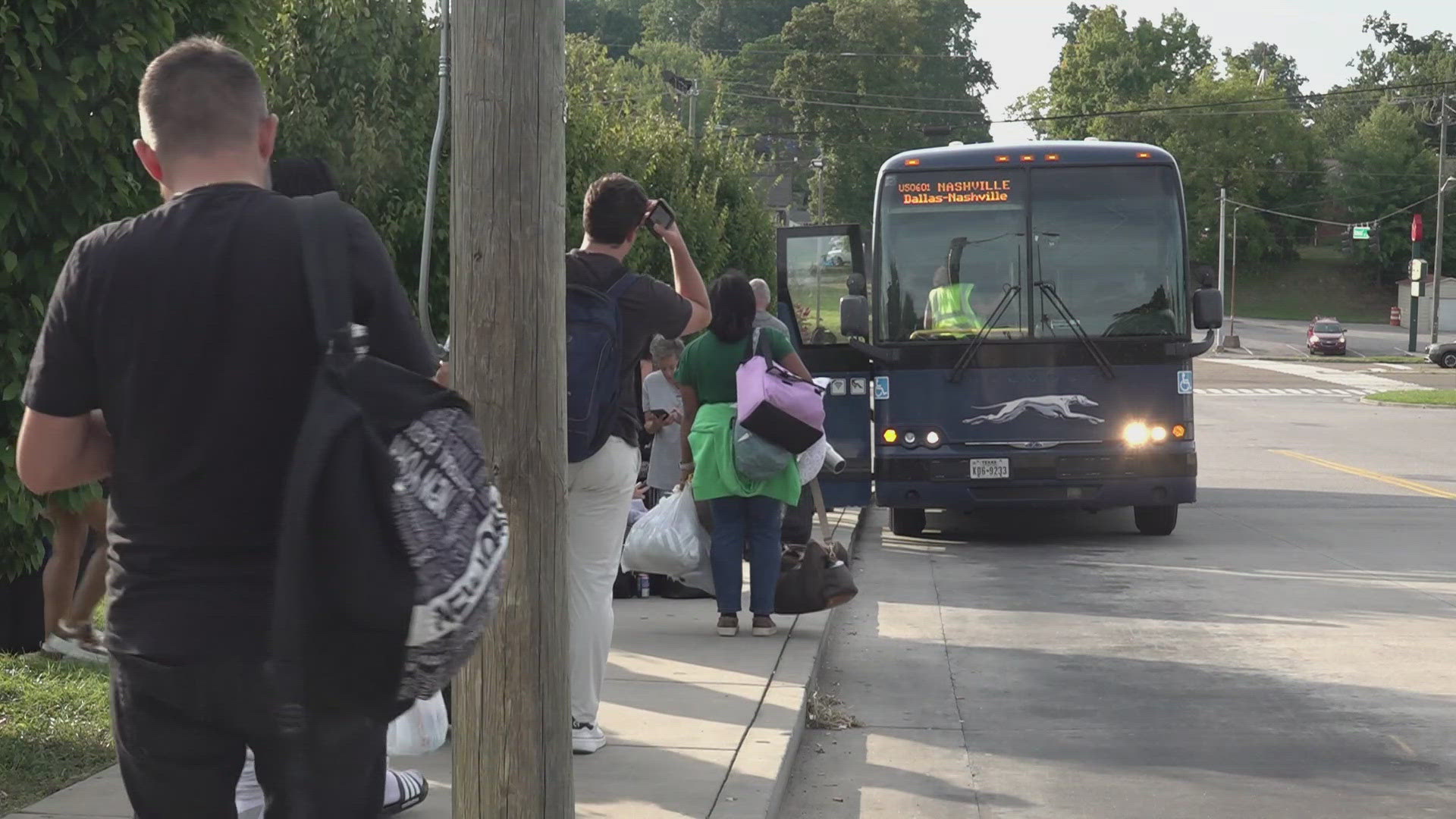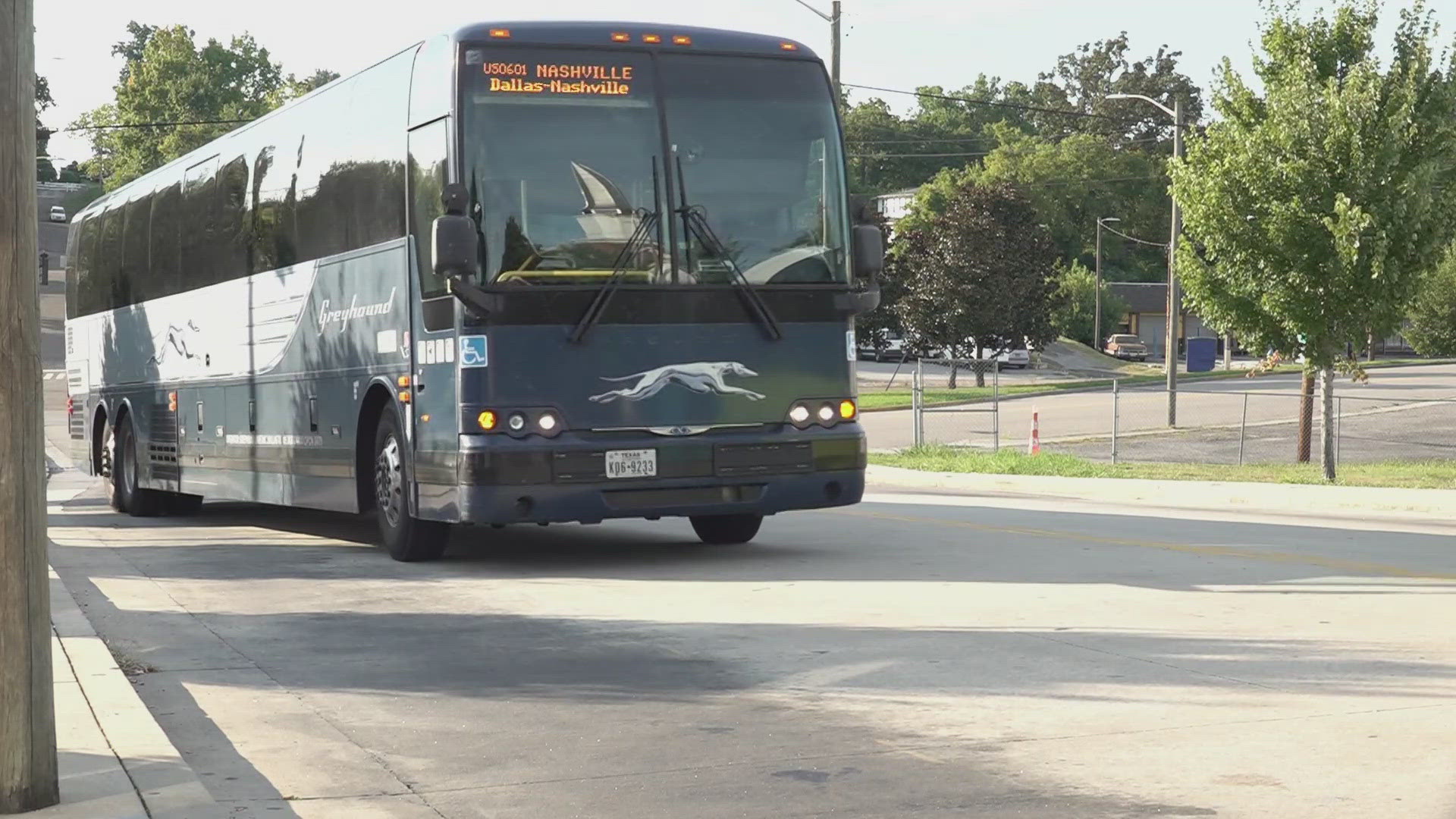10Investigates: Greyhound bus riders experiencing 'inhumane treatment' at Knoxville stop
From waiting in a "hot box" to riding on a bus that "smells like sewage," issues surrounding Greyhound's operations remain.
WBIR
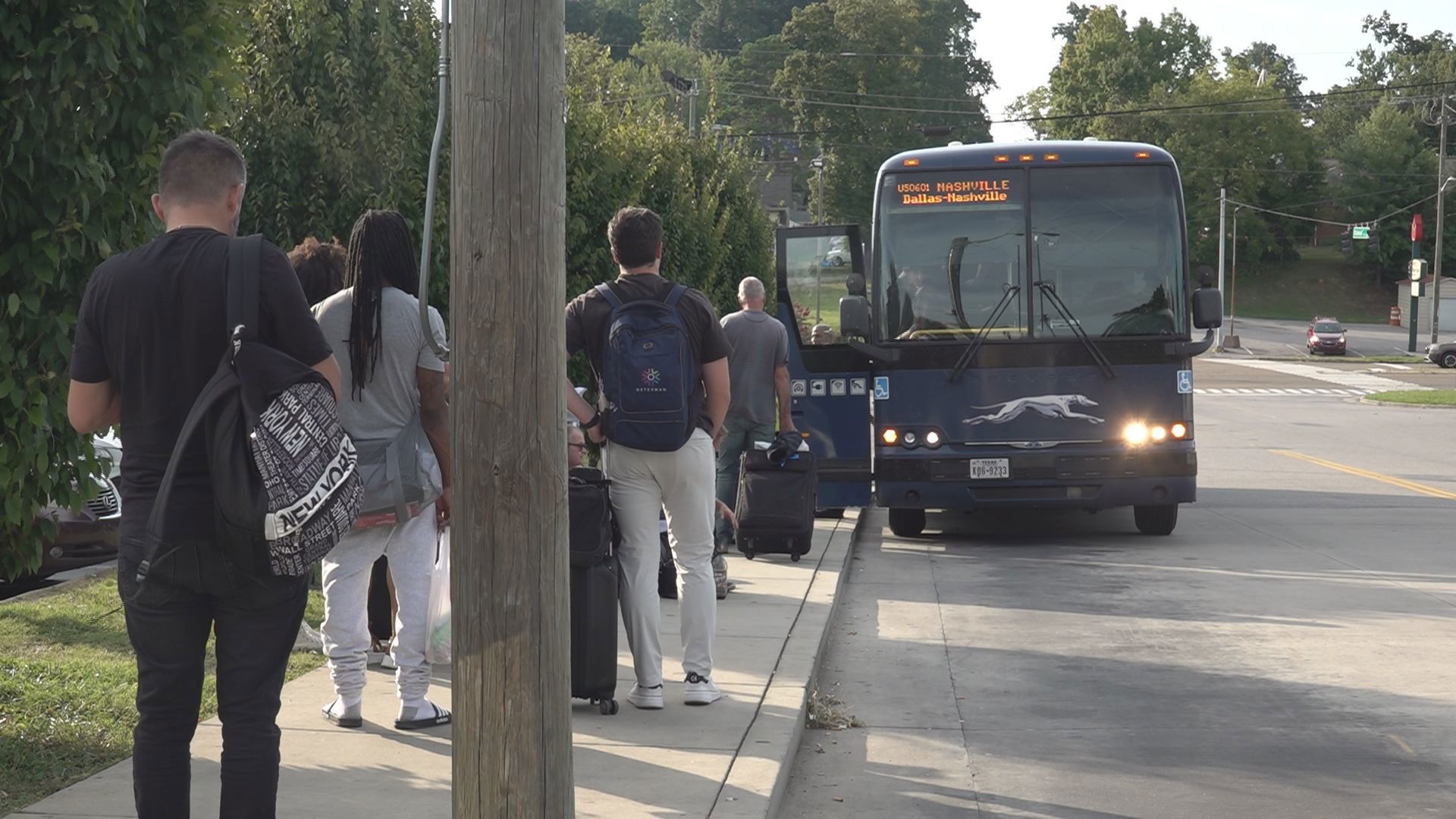
Sweating under the scorching sun. Shivering in the freezing rain. No access to food, water or restrooms. That is what it's like to wait for a Greyhound bus in Knoxville.
In 2022, Greyhound sold its station at the corner of East Magnolia Avenue and Central Avenue. The Knoxville stop was moved three times that year. Now, it's located at the Knoxville Area Transit Superstop on Kirkwood Street.
We spent hours at the bus stop talking to people and seeing firsthand what the conditions were like waiting for a bus.
Waiting for the Greyhound bus; Rider's POV
Knoxville resident Tyler Frederick uses the Greyhound bus to visit his mother in Georgia once a month. The last time he tried to take the bus, it was storming, so he hid from the rain in the bushes nearby before giving up after two hours.
"To be honest with you, it is kind of sad," Frederick said.
When asked how he felt after having to cancel his entire trip, he responded with, "Frustrated."
For a first-time Greyhound rider, Jesse Adams didn't know what to expect. At the time, Adams was trying to get back home to upstate New York after spending six days in Knoxville visiting a friend.
He told us instead of waiting at a bus stop, he was envisioning waiting in a building. However, when waiting for the bus, Adams chose to sit in the shade because sitting on the bench directly in the sun looked "like a hot box."

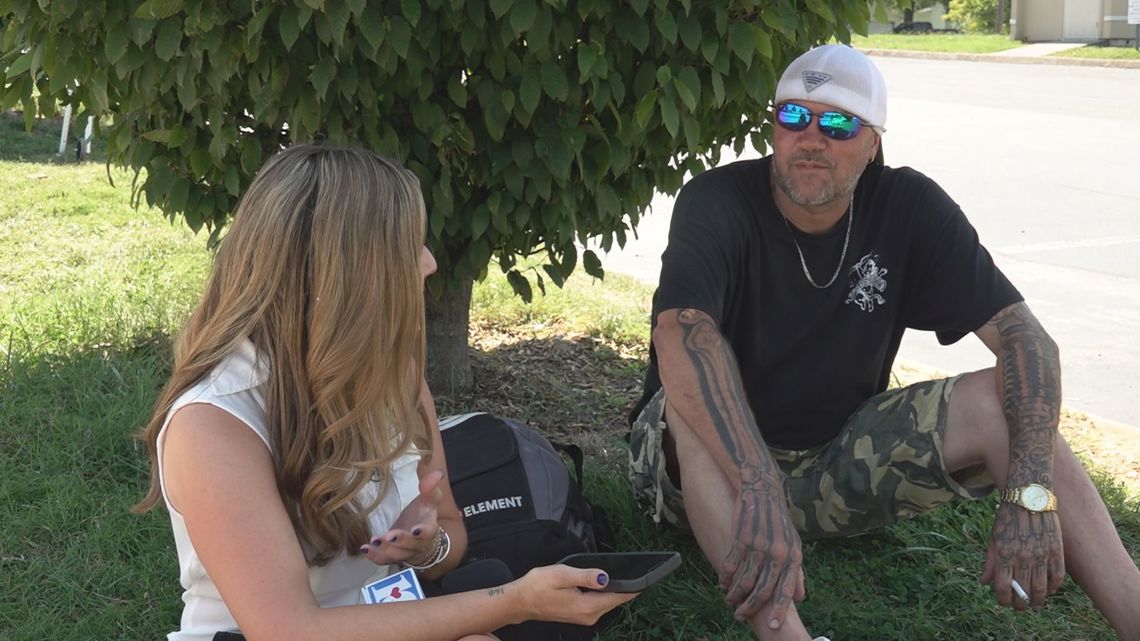
For Sammi Guerra, she visited the United States while on break from university in Australia. She said that sitting in the "hot box" felt like a safer option.
"I was just like, is this safe? Like, 'cuz obviously I'm by myself, I'm a female," Guerra said. "My first thought is like, what the hell am I getting myself into? But it's fine."

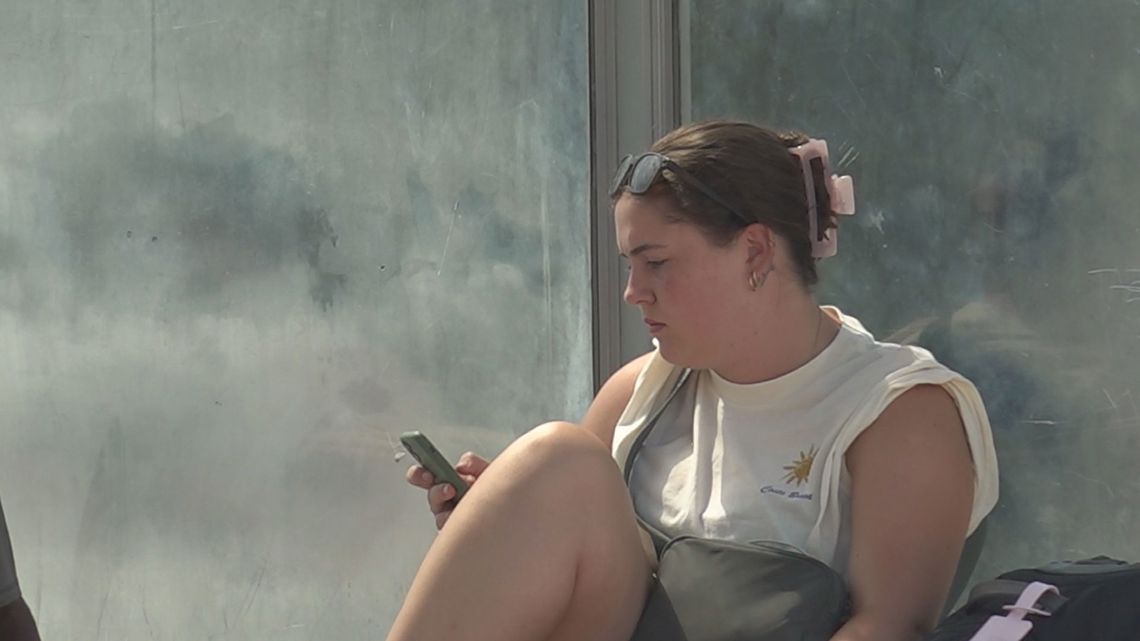
A concern that's rising as the sun starts to set for people like Johnny Hall from South Dakota. Hall said that waiting for the Greyhound bus is unlike the other stops he's waited at.
"I don't like it because, to be honest, I mean, everything I heard shuts down at 10," Hall said. "So, there's an hour and 45 minutes with no restroom at all."
With the lengthy delay, Hall mentioned there are no accommodations to make sure people are comfortable.
"There's no place to get any kind of soda…It's, uh, sweaty," he said. "You get thirsty pretty quick. And, you get exhausted pretty quick too. There's nowhere really to lay down unless I go about the church. And then I don't really know this town very well so I don't know how safe it is."

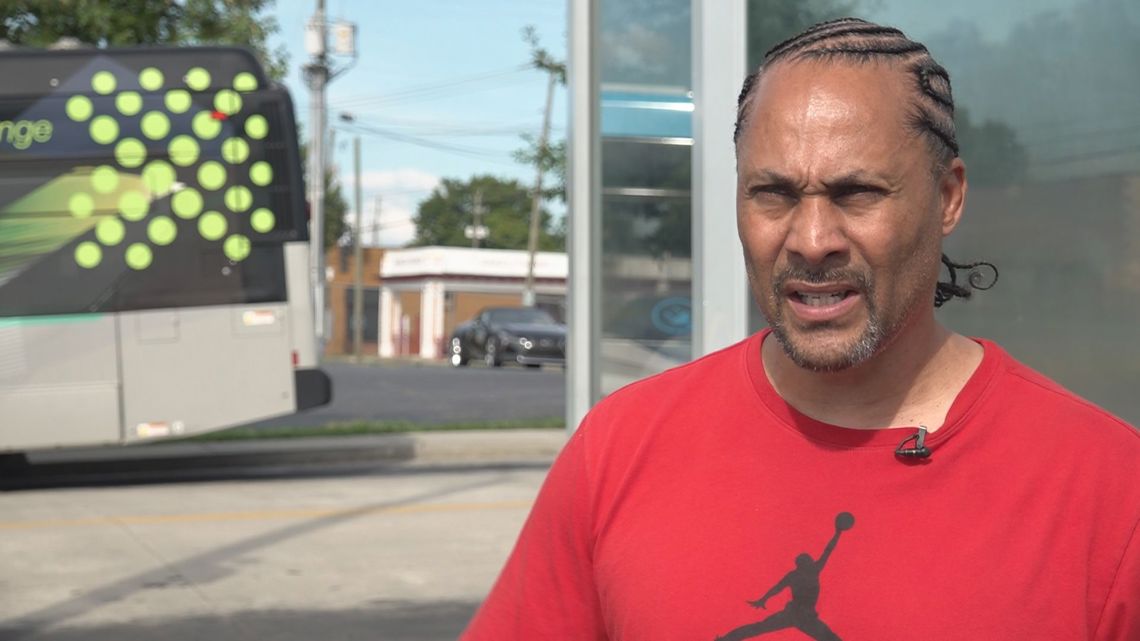
While Hall doesn't know Knoxville, it is the place Scott Brown and Shawn Martin call home.
"It seemed like the city or the Greyhound bus station could come together and make some kind of changes to help these people out," Brown said. "The city belongs to all of us. Why not all of us work together and find a happy medium? And it takes all of us to do it. So I don't understand why not. Why is that so hard?"
Martin rides the KAT bus every day getting off at the East Knoxville bus stop where he sees Greyhound riders stretched along the road.
"These poor people have got to sit out here," Martin said. "It don't make no sense. It's torture. They've got to sit out here for hours. It's ridiculous."
Jean Hoard tried to go see her son but her 6:35 p.m. bus was delayed until 8 p.m.
"When you expect a station, you're expecting a building, you know?" Hoard said. "That's what I always think. But you know, this is the first one that's been like this here in Knoxville that is just on the side of the road because all the ones I've been to before is they've had big stations, you know, like Columbia. He has to be at work normally at that time. So he's having to work around, you know, being late to work to have to pick me up at the bus station."
The Kirkwood station isn't the only Greyhound bus stop with issues. As our sister stations from across the United States have been reporting, Greyhound buses are experiencing similar problems all over the country, from Washington to Texas to Georgia and beyond.
City Councilwoman Gwen McKenzie told us the city has tried to work with Greyhound to move the stations, but has declined their offer.
"Greyhound is a privately owned company, so that's absolutely nothing to do with this city," McKenzie said. "And so they're doing this all across the United States. It's not just isolated to Knoxville, Tennessee."

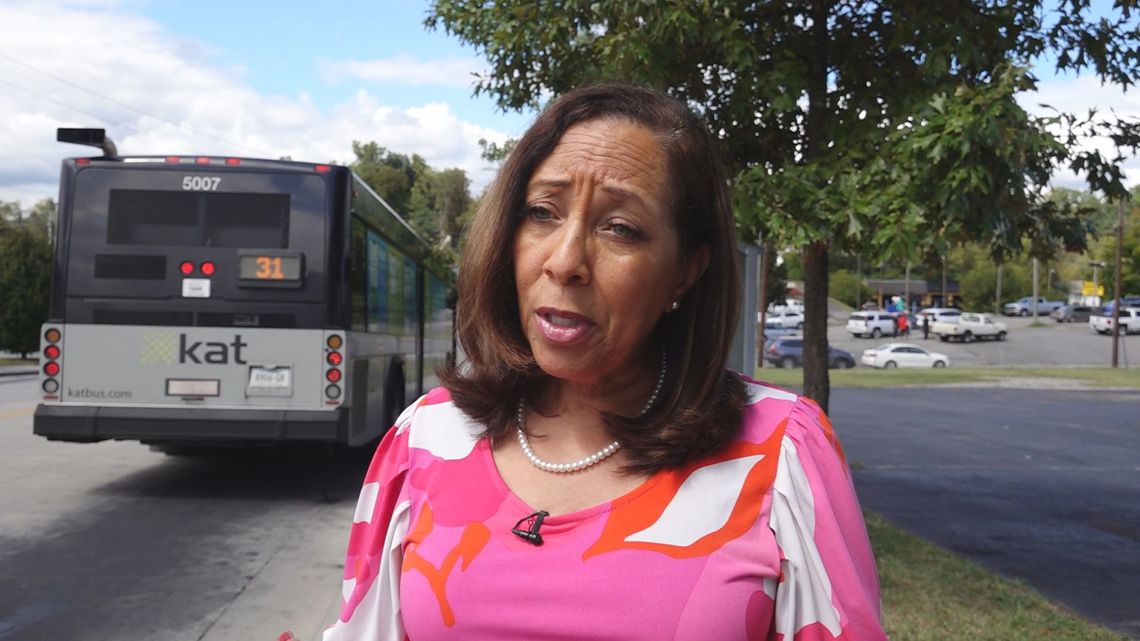
A spokesperson for the city said it does not have any regulatory oversight over Greyhound or any partnership with the company, so it says Greyhound is solely responsible for its operations.
The city said Greyhound has been negotiating with private property owners but, to the city's knowledge, has not reached an agreement yet for another location. The city provided the following statement:
“That said, the City has consistently and strongly recommended that Greyhound partner with another private business that can offer restrooms, indoor shelter with heating/air conditioning, and 24-hour operations with food options.”
"I really wish that there was more the city could do to hold them accountable, but they're a private company," McKenzie said. "You know, at this point, I do feel like it's going to take their passengers, their riders, their customers to start looking at what legal actions and ramifications do they have because if these people are sitting out here late at night, overnight, early in the morning, I mean, it's not safe. They have nowhere to use the restroom. They have really nowhere within walking distance to be able to go and get food since Buddy's now is closed for repairs. I mean, it's really inhumane treatment, in my opinion."
For riders like Adams, a fix would be priceless. He initially considered getting a plane ticket back to New York.
"I'm calling the airport, they were like $900 for a freaking ticket and I'm like screw that," he said. "If I would have known this, I probably would have paid it and said screw it and just went."
However, Adams said if he had known he had to wait for his bus under a tree in the shade for hours, he would have paid $900. Instead, he has a Greyhound ticket that he bought on his phone, which was dying after hours without access to an outlet.
"I'm at 10% right now," Adams said about his phone's battery charge. "So now I’ve got to figure a way to charge it because my ticket's on it."
While Frederick said it is a major frustration, he is hoping the city and Greyhound will work together to find a solution, no matter what that looks like.
"If we can, if we can. Let's go Greyhound," he smiled.
WBIR reaches out to Greyhound
10News reached out to Greyhound with the following questions about the bus stop, current operations and future plans.
- How profitable is the company? How profitable is the Knoxville stop specifically and how many tickets do you sell in a year or a month?
- Greyhound is continuing to use KAT's Kirkwood Super Stop in Burlington. According to a representative with the city, "the City has consistently and strongly recommended that Greyhound partner with another private business that can offer restrooms, indoor shelter with heating/air conditioning, and 24-hour operations with food options in order to provide its customers a more appropriate pick-up and drop-off service location." Do you have record of receiving those recommendations? Are you planning to implement any changes at the stop? Any eventual goals to get shelter, A/C, chargers, porta-potties, etc.? If not, what are the plans for the Knoxville bus stop?
- Is there any collaboration with local city/county leadership here in Knoxville when it comes to the bus stop?
- Is Greyhound negotiating with private property owners in regards to the Knoxville stop?
- Is the Knoxville stop in line with Greyhound's business model in many other cities? How many stops across the country do not have access to indoor shelter, restrooms, food options, etc.?
- Why is there no signage on the bus stop? Any plans to get that?
- When are refunds or vouchers granted?
- What subsidies does Greyhound receive?
- Is Greyhound aware of formerly incarcerated people using the bus after getting out of prison to relocate? Is that a program or partnership with Greyhound and cities?
- Do you know if hospitals around the country or in certain areas use Greyhound buses to transport recently discharged patients with no means of travel/pickup otherwise?
Greyhound declined to answer, although a Flix North America spokesperson sent 10News the following statement:
"Intercity bus travel is a vital source of connectivity for people across Eastern Tennessee, including low-income populations, people with disabilities, and residents of rural communities. We look forward to continuing to provide Knoxville and the surrounding area with affordable, accessible, sustainable long-distance transportation."
Transportation statistics
A study from the Institute for Child Success shows that transportation is equivalent to access to housing, employment education and healthcare. ICS is dedicated to improving the lives of children and their families from before birth to eight years old.
According to ICS, transportation "mediates the ability of individuals to physically interface with resources and amenities in their community." Public transportation exists to ensure that the community can access these resources, regardless of their ability to afford or operate a personal vehicle.
Access to housing, employment, education and healthcare are all dictated by transportation, the study said. Transportation can be expensive and is typically the second largest expenditure for households next to housing.
Housing and transportation combined can add up to over fifty percent of a household’s yearly income if affordable options are not available, according to the study.
Seeing as the average cost per year of owning and using a new car is $12,297, according to AAA, many families depend on public transit.
According to the study, the reliance is often portrayed as a reason to minimally fund public transit because dependent riders will ride regardless. The study says we often don't consider how an insufficient public transportation system contributes to creating dependent riders.
The Greyhound rider experience
From late buses to no shelter from the elements to no restrooms or chargers, the issues at the Greyhound bus stop on Kirkwood are eminent, but what about when the bus comes?
We bought a ticket for the bus that dropped us off in Crossville at a Marathon gas station to see how the experience was for other riders.
Here's how it went.
Passenger Andrew Bresnock is no stranger to the Greyhound bus system. He is from Atlanta and has used it in a pinch multiple times in the past.
"I would rather fly," Bresnock said. "But unfortunately, I didn't have any connecting carriers today out of Knoxville. So I had to take Greyhound. I have had some pretty crazy experiences. I was stranded at the Atlanta bus terminal for almost 24 hours waiting for another connection to come back around. And that was a pretty traumatic experience. I ended up sleeping on the floor."
Bresnock was on his way to visit friends in Savannah when he picked up a ride from the Knoxville bus stop for the first time.
"It looks like a school bus," he continued about seeing the stop. "I mean, it doesn't look like anything that is…anybody would be looking at and saying, ‘Hey, that's a Greyhound bus stop.’ It's pretty crazy for passengers to have to just board right off the street."
Passenger Michael Nazelrod is from Virginia and said he rode on the bus for nearly eight hours straight.
"It was hot and stinky," Nazelrod explained.
While riding the bus, there was a strong smell of sewage.
"I do apologize for the smell," the Greyhound bus driver said to passengers over the intercom. "If you would like to go ahead and communicate if you would like a voucher. I'm not aware if they're still doing refunds or not, but they will give you a voucher for something like that."
10News reached out to Greyhound to try and get the voucher/refund and was told, "Our records show that the service was still provided and completed, therefore we are unable to honor your request.”
For Carlos Daniel Pernia Rosario, who lives in Dallas and rides the Greyhound frequently around the country for work, it is not just the restrooms.
"I've always taken the Greyhound bus," Rosario said in Spanish. "They have a lot of improvements to make, like bus stops, the bathrooms, the rest stops, chairs, chargers, the WiFi."
For Brandon Jillson, who used the bus to move to Knoxville from Indianapolis, those issues are inconveniences worth it for an affordable ticket.
"It cost me $60 to get from Sweetwater to Knoxville," Jillson said. "It's over half what I paid to get all the way home. So that's definitely a benefit."
But Yolands Chavira is not sure she agrees.
"I think I'd rather fly," Chavira said. "I think next time I'd rather fly."
While flying is also the option that Bresnock prefers, he said having a reliable, safe, dependable and more affordable transportation option through Greyhound should still be an option.
"This is the historical American way of travel," he said. "It started with Trailways Bus Ways back in the day and I hope to see it really change. I think there should be subsidies and some kind of government intervention to save a lot of the problems that Greyhound is having because there's no oversight right now and I think that's why it's suffering. It's falling to the wayside."

